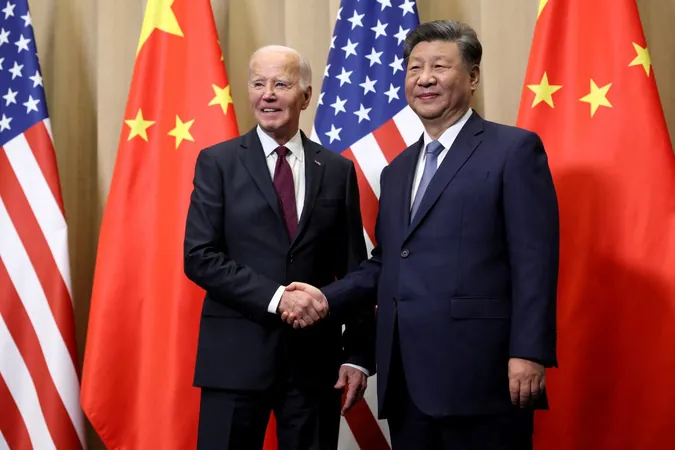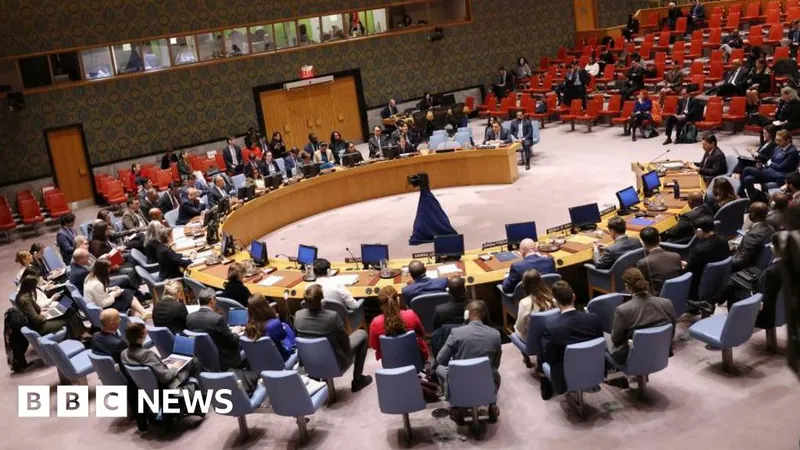
Xi Jinping Unveils Four Crucial 'Red Lines' for US-China Relations in Critical Meeting with Joe Biden
2024-11-18
Author: Jessica Wong
In a pivotal meeting at the Asia-Pacific Economic Cooperation summit in Lima, Peru, Chinese President Xi Jinping outlined four significant "red lines" that the United States must not cross in the delicate landscape of US-China relations. This crucial encounter with outgoing President Joe Biden, lasting two hours, served as a defining moment in the two leaders' diplomatic engagement.
President Xi extended an olive branch to the incoming administration, emphasizing China's commitment to dialogue and cooperation while cautioning against the emergence of a "new Cold War." His messages were underscored with warnings, particularly in light of the anticipated policies of former President Donald Trump, who has signaled a confrontational stance towards China.
Although Xi did not mention Trump directly, he clearly stated the principles guiding China's foreign policy. "The Taiwan question, democracy and human rights, China’s path and system, and China’s development rights are four red lines for China," he declared, asserting that these issues must remain unchallenged. "These are the most important guardrails and safety nets for China-US relations."
In response, Biden acknowledged the necessity for open communication, even amidst their differences, describing their discussions as "frank and candid." As the bilateral dialogue unfolded, concerns about an impending trade war loomed large. Trump has made headlines by promising to impose a staggering 60 percent tariff on Chinese goods, vowing to prioritize "America First" trade policies.
Xi issued a strong warning against the idea of containing China, stating, "A new Cold War should not be fought and cannot be won. Containing China is unwise, unacceptable, and bound to fail." He specifically highlighted the situation in Taiwan, pressing the US to handle the "Taiwan question" with utmost caution, specifically referencing Taiwanese President Lai Ching-te—a figure perceived as a proponent of independence.
He further stressed the need for the US to abstain from intervening in disputes over territories in the South China Sea, criticizing American policies aimed at limiting China's access to advanced technology. Xi condemned the approach dubbed "small yard and high fence," employed by US National Security Advisor Jake Sullivan, which aims to restrict Chinese technological advancement.
In a broader context, the White House's readout emphasized the importance of responsibly managing competitive elements in the relationship and called for an end to the ongoing conflict in Ukraine. Amidst growing tensions, Biden raised concerns regarding North Korea's alleged troop deployment to Russia, emphasizing the effect of these actions on global peace and security.
As the international community watches closely, both leaders recognize the importance of maintaining a dialogue that safeguards their nations' interests while preventing escalation into outright conflict. The stakes are high, and the world awaits how these red lines will shape the future of US-China relations, especially as a new administration prepares to take office and navigate these complex dynamics.



 Brasil (PT)
Brasil (PT)
 Canada (EN)
Canada (EN)
 Chile (ES)
Chile (ES)
 España (ES)
España (ES)
 France (FR)
France (FR)
 Hong Kong (EN)
Hong Kong (EN)
 Italia (IT)
Italia (IT)
 日本 (JA)
日本 (JA)
 Magyarország (HU)
Magyarország (HU)
 Norge (NO)
Norge (NO)
 Polska (PL)
Polska (PL)
 Schweiz (DE)
Schweiz (DE)
 Singapore (EN)
Singapore (EN)
 Sverige (SV)
Sverige (SV)
 Suomi (FI)
Suomi (FI)
 Türkiye (TR)
Türkiye (TR)